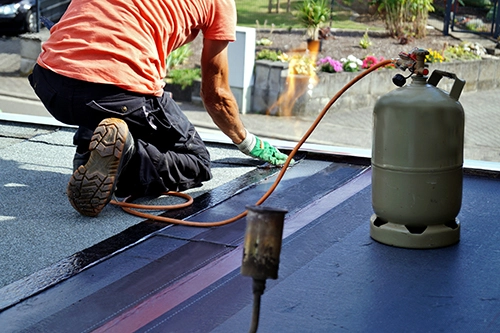- About Us
- Services
- Blog
- Contact
Need a quote?
Hiring a roofing company in London makes sense when you need a new roof installed. Unfortunately, lots of homeowners prefer the DIY route as they think it’s worth trying. While you might have enthusiasm, it can be incredibly dangerous to tackle roof installation without proper know-how or training. So, putting that to one side, what are the reasons to hire a roofing company in London?




Let’s be honest, anyone can watch hours of roof installation videos online and think tackling a few broken tiles is easy, but the reality is far from that. Installing a new roof is incredibly difficult because it must be done perfectly and lots of things can go wrong. For instance, tiles can be installed incorrectly which can cause a leak. It means you must spend more money to fix the problem. When you hire a roofing company in London, however, you avoid these problems. And you can rest assured the new roof will be installed properly.
Professional roofers know the risks of the job. It’s a dangerous job, regardless of how skilled you are, and without the right safety equipment, everything can go wrong. A roofing company London, however, uses the appropriate safety equipment during the installation. It means they keep themselves safe and prevent unnecessary work accidents.
Working on a roof isn’t easy; several things could go horribly wrong. When you don’t have the experience, you are more likely to do something wrong and it could be fatal. A roofing company in London has the experience to avoid such things. A roofing company will send an experienced team to inspect the roof and make the necessary repairs. It makes a difference to those with no industry experience.
A roofing company London are the best people to turn to when you want a new roof installed or need some repairs. Professional roofers have the experience, the know-how, and will ensure the installation is perfect. Trying the DIY route isn’t smart, especially when it comes to roof installation because so many things can go wrong. A professional roofing company London will ensure the installation is done safely and to a high standard as well.
It depends on the construction, but the minimum weight a flat roof must be capable of bearing is 300lbs. This refers to a concentrated weight where a load is positioned on just one area of the roof. So, for example, a commercial flat roof can approximately support a 300lb HVAC unit in a 2.5×2.5ft single space.
If you opt for a flat roof anywhere on your property, remember that it comes with a need for proper maintenance. Low-slope roofing London-wide should be checked every six months or so, or after spells of bad weather, to spot any signs of damage. No matter how small, these should be addressed before they escalate. Remove any debris (leaves, twigs and so on) regularly to avoid these blocking the gutters and allowing water to pool and stand on the roof.
If there are trees in the close vicinity, keep them cut back to reduce the amount of foliage that falls on your flat roof. And check internally for signs of moisture, dampness or water damage on a regular basis. Spotting problems early means resolving them will be cheaper in the long run.

Building a flat roof can be done in three ways. The simplest and most cost-effective choice for levelled roofing London-wide is to construct a warm roof where a roofing membrane is placed over the insulation that keeps the timber structure warm. Another option is to create a cold roof where insulation is positioned between the rafters under the ply roof covering. This is commonly applied to flat-roofed extensions.
The third method is the hybrid roof that contains diverse elements. Their designs require a gap of ventilation above a warm roof to prevent excess moisture within the roof structure.
If you’re looking for flat roofing local contractors, don’t just select the first firm you come across. Find a roofing company that’s been in business for a while and can demonstrate a good track record in installing, repairing, and replacing flat roofs specifically. Ask for recommendations from your own network or from a local trade association. If you need refurbishment work done to 50% or more of your roof, you’ll need a roofing contractor who can self-certify their work under the Competent Person Scheme. Otherwise, the Building Control department at your local authority will need to approve the job before it begins.
Ask whether they are covered by liability insurance and how long they’ll guarantee the work they will carry out. And never just opt for the cheapest quote unless you’re quite sure they’re the best company for the job. You can’t afford to compromise on your roof as the structural integrity of your property depends on it.
Ensuring your flat roof will comply with building regulations before installation can save property owners time, money and stress. First, the roof must have a slope of around 1:80, with water draining away to one or two roof edges. Waterproofing must be extended up to the adjacent walls with at least 150 mm from the surface of the roof.
Contractors must install ventilation in cold roofs. For warm roofs, the deck must be bonded with a VCL. The roof should have the capacity to withstand strong winds and be sturdy enough to take an individual’s weight. Finally, check whether planning permission is needed. Typically, this is only required if you live in a conservation area or a listed building, or are making significant changes to an existing roof.
If you’re looking for top roofing solutions at competitive rates, check out our range of roofing services at Environ Roofing Company London. To get started, call one of our representatives today!

